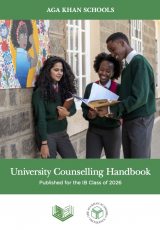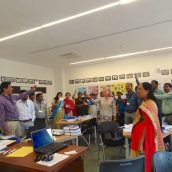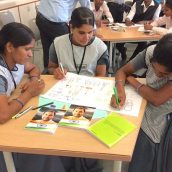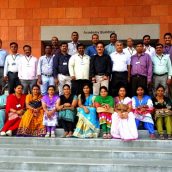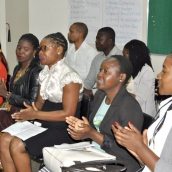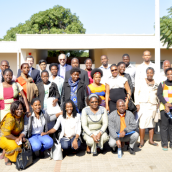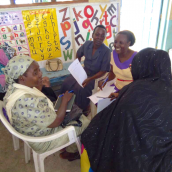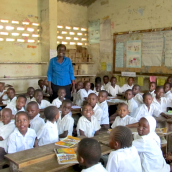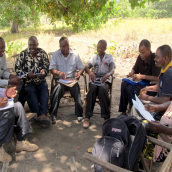Strengthening teaching beyond the Academies
Even before an Aga Khan Academy is constructed or begins selecting its first intake of students, the Academy’s Professional Development Centre is already hard at work helping local educators improve their skills.
The Aga Khan Academies have a dual mandate: to develop talented students of all backgrounds, regardless of means, into future homegrown leaders; and to contribute to their respective national education systems by strengthening the quality of teaching and school leadership in government and other private schools.
Each Academy includes a Professional Development Centre (PDC) that both prepares high quality teachers for the Academy and also develops educators in the government system through an explicit focus on outreach education. The Academy itself also plays a catalytic role as an exemplar of the best teaching practices.
“The vision of the Academies is to share what they have in terms of expertise, skills and resources with the surrounding communities,” explained Rupen Chande, Outreach Manager at the Aga Khan Academies.The PDCs within the three operating Aga Khan Academies in Mombasa, Hyderabad and Maputo have all been active in providing a range of programmes to support schools and communities as part of their outreach work – this work is customised to each cultural context and the unique governmental system of schooling.
“We can’t just work with a small group of teachers in a school,” said Chande. “We need to work with the system that supports the teachers and leaders for any change to be sustained over the long-term.”
Recent activity at all three PDCs, outlined below, provide illustrative examples of some the outreach efforts being undertaken by the Aga Khan Academies across the education spectrum. This includes strengthening the skills of teachers to improve classroom practice (Hyderabad), improving the ability of school leaders to manage their schools effectively (Maputo), and establishing educator learning networks to ensure collaboration and sustainability of change over the long term (Mombasa).
Hyderabad: Strengthening teaching skills
The Professional Development Centres across the Academies network implement a series of programmes known as the Professional Learning for Educators Series (PLES). The PLES programmes have been specially designed by the Aga Khan Academies to respond to the needs of teachers, as identified through research and dialogue with government officials and education departments.
PLES includes programmes for teachers in various subject areas such as English and mathematics, as well as specialised programmes focusing on skills needed for effective teaching. Each PLES course is structured in three sequential, developmental tiers and include both classroom-based learning as well as in-school support. In June 2017, the Outreach Department at the Aga Khan Academy Hyderabad launched the second tier of PLES for 30 government secondary school teachers, aimed at English language acquisition and improving classroom pedagogy. The participants went through two weeks of intensive classroom sessions consisting of a variety of activities under the guidance of Manager of Outreach Rajan Thampi, Master Trainer Wendy Elliott and Course Facilitator Dan Arnold.“The PLES programme is unique in that it specifically targets teachers who are engaged in English language classroom teaching,” explained Wendy. “The aims of the programme are two-fold: first, to develop and further English language competency in teachers; and second, to develop methods of communication so that teachers and students may engage in language learning as equal participants through authentic exchange.”
“Our programme has been very successful this year,” remarked Rajan. Participants started a PLES Whatsapp group to collaborate and exchange ideas and information, and “two participants have been given additional teaching duties in English in their school due to a marked improvement in their grasp of the language,” he noted.
As part of a Memorandum of Understanding with the Telangana State Education Department, the Academy has pledged to train 500 government educators over a three-year period through PLES. Built into the programme is a subsequent Training of Teachers (ToT) Programme, which trains selected graduates of PLES to become facilitators and PLES trainers themselves.
Maputo: Enabling effective school leadership
On 15 June 2017, 16 public primary school educators, including head teachers and pedagogical leaders, graduated from a certificate course in Educational Leadership and Management offered by the Aga Khan Academy Maputo’s PDC, in collaboration with Mozambique’s Ministry of Labour, Work and Social Security.
The certification of this group of head teachers and primary school teachers is in line with strategic efforts being made by the Ministry of Education and Human Development to build leadership capacity amongst the nation’s educators. Regina Miguel Langa, National Deputy Director for Teacher Training, praised the programme, noting that “school management is a big challenge for the Ministry of Education and Human Development, and in order to achieve good quality education it is important to have good school managers.”The Educational Leadership and Management course is unique in Mozambique in its focus on leadership skills and in its teaching methodology, which involves a combination of face-to-face group sessions as well as support provided to educators within their schools. Participants develop clear and realistic plans for their school’s development, and learn how to conduct school-based action research and provide support to classroom teachers. Head teachers are challenged to implement good leadership practices in their schools, including collaborative management, transparency and open communication among all members of the school community.
At the graduation event, the Class of 2016/2017 representative, teacher Danilo Ventura stated emotionally, “We are committed to the implementation of what we have learned, collectively guaranteeing improvement in the quality of teaching in our schools… We finished this course with the profound determination to disseminate what we have learnt among our colleagues in the schools where we work.”
Mombasa: Establishing professional learning networks to sustain change
The PLES programmes were pioneered at the Aga Khan Academy Mombasa’s Professional Development Centre and have been offered for a number of years with the aim of deepening the regional pool of well-trained teachers. Since 2010, the PDC has extended its outreach programmes for practising head teachers and classroom teachers through the creation of five professional associations. These include the Mombasa Educational Leaders Association, the Kwale Educational Leaders Group, the English Language Teacher Association, the Mathematics Teachers Association, and the Education Facilitators Association.
These associations are composed of alumni from PDC outreach programmes and meet monthly during the school year as professional learning networks (PLNs). The aim of these networks is to enhance teacher-teacher collaboration and engage educators in working together to improve school practices and student learning outcomes. The PLNs are a source of ongoing professional learning and support for the participants, as an extension of the initial training they received from the Academy. One PLN participant noted, “Learning takes place every day, every moment of every day. So I want to look at research before I deliver a lesson to improve the quality. My work with [the association] has helped me better research information. I want to know more about what and how I’m teaching.” A research team from the Ontario Institute for Studies in Education at the University of Toronto and the Aga Khan Academy Mombasa undertook an 18-month study to explore the potential and challenges of PLNs as means for continuous professional learning and school improvement. The results of this study are being shared with key stakeholders in Kenya at the end of June 2017. Findings indicate that participation in PLNs increased teacher confidence, helped establish collaboration as a professional norm and increased commitment to teaching as a career or vocation.PLNs are also actively reaching out to other classrooms and schools to share what they have learned, thus extending and multiplying the benefits of improved professional knowledge and skills within the education system. The PLNs are now becoming widely recognised as a strong model – a Curriculum Support Officer has been appointed by the government to support the PLNs and the Kenya Institute of Curriculum Development is considering launching a community of learners nationally based on the PLN experience.
At a PLN meeting, one of the meeting leaders emphasised the mutual benefits of sharing experiences: “When we have success among ourselves it motivates us not to give up... Let us share our approaches, visit each other, share challenges. Share the strengths of others to overcome our own weaknesses.”
Newsletter readers please click here to return to the newsletter (browser version)
publications
